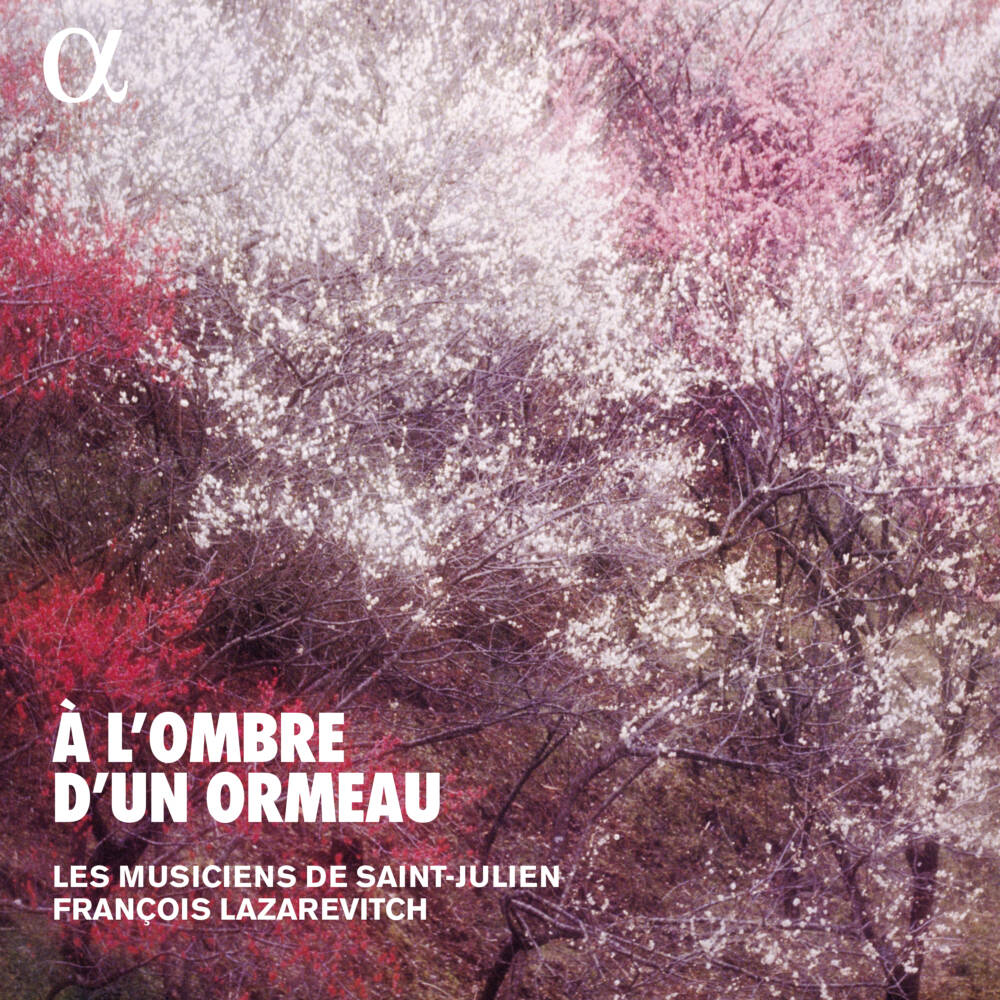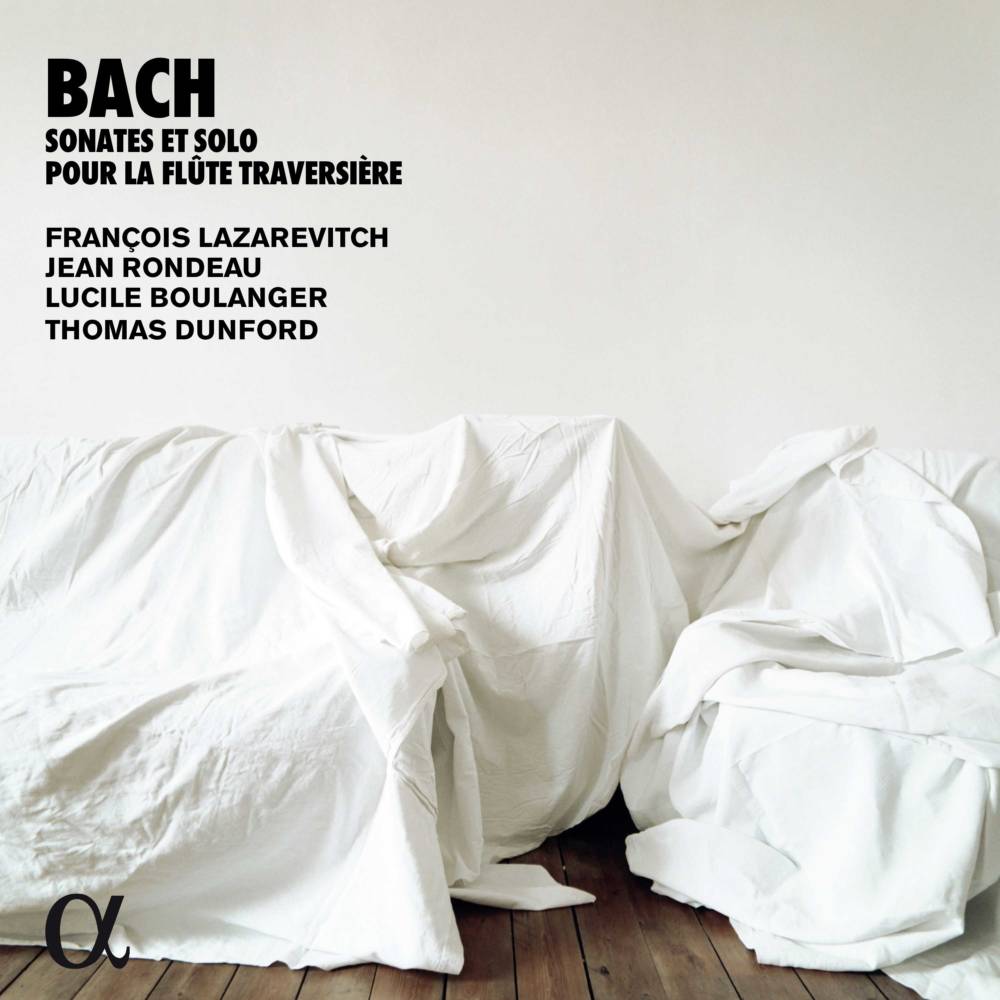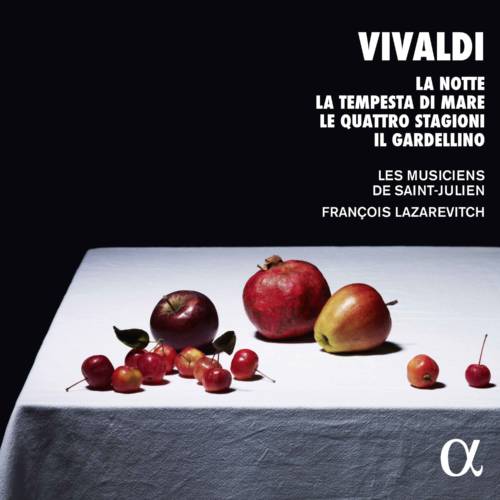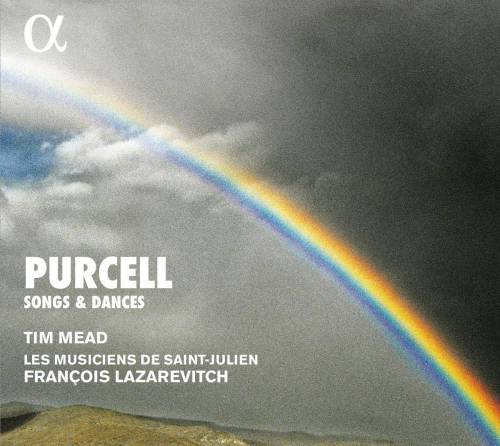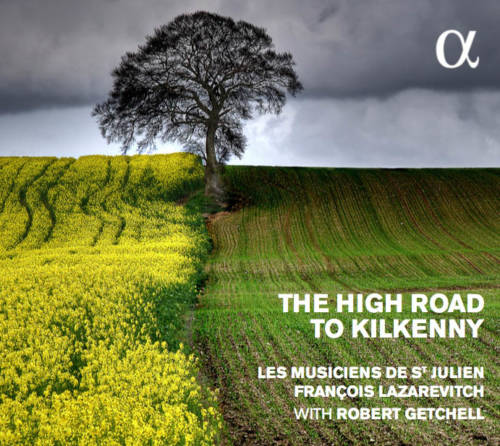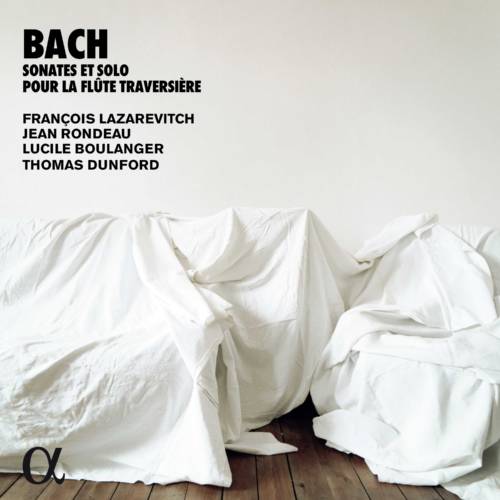Purcell, Songs and dances
Tracklisting
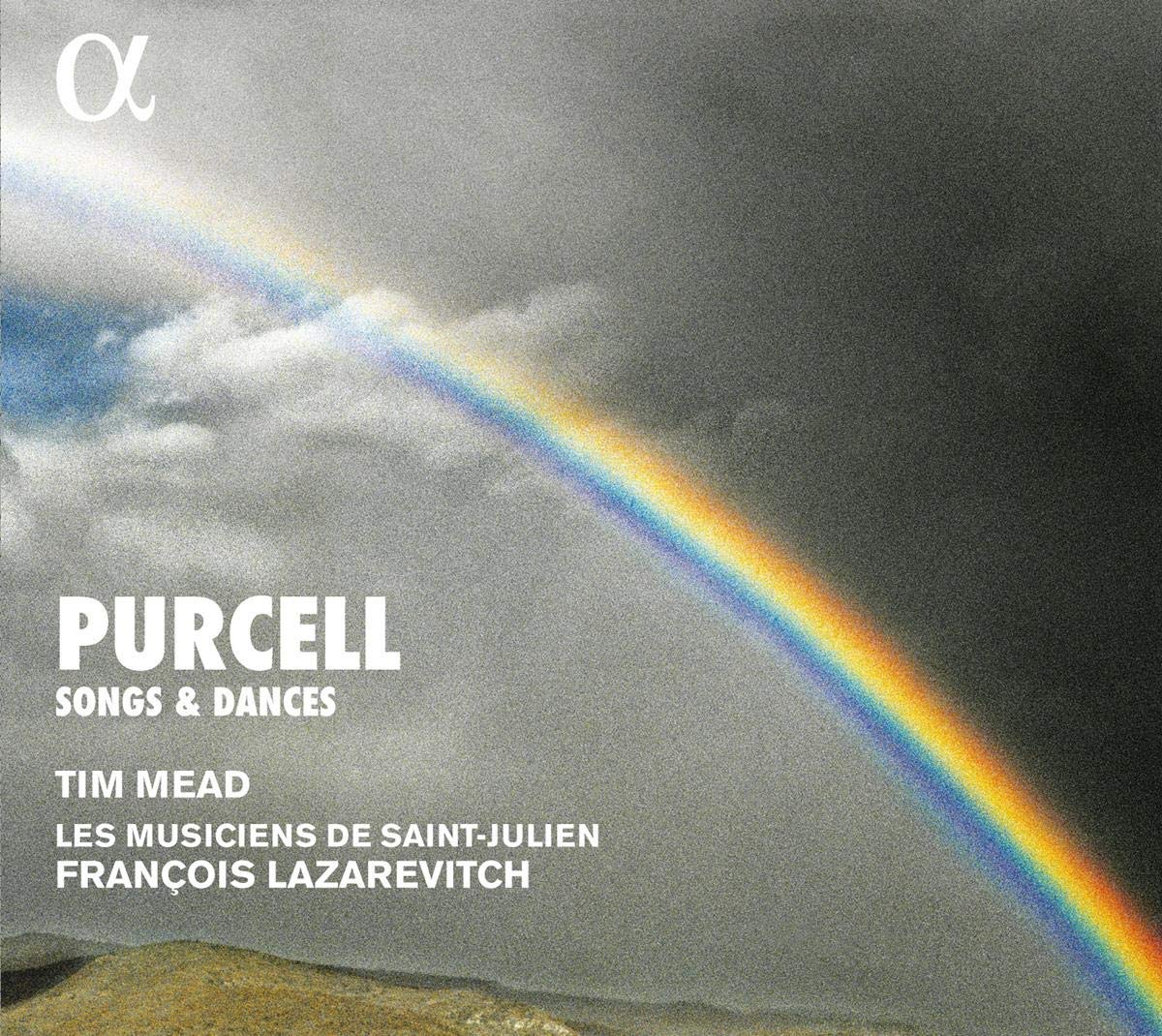
 The Sunday Times – Album of the Week
The Sunday Times – Album of the Week
Alpha Classics • Alpha 419 • ISBN 3760014194191 • 1 CD • 1 h 06
- Minuett – Hornpipe – Boree (3:44)
- Stricke the Viol, Touch the Lute (3:40)
- O Solitude, my sweetest choice (5:21)
- Pavan in G minor (4:38)
- Here, the Deities approve (4:22)
- Hornpipe (2:16)
- May her blest example chase (3:11)
- Fairest Isle (4:19)
- What power Art Thou (2:46)
- Aire (1:10)
- Twas within a furlong of Edinboro (3:14)
- Scotch Tune (2:05)
- Here let my life with as much silence slide (3:04)
- Fantazia upon a ground (4:46)
- Tis nature voice (4:49)
- March (1:30)
- Curtain Tune (4:19)
- Song Tune (1:42)
- One charming Night (2:15)
- Chaconne (2:49)
Listen to the disc
About
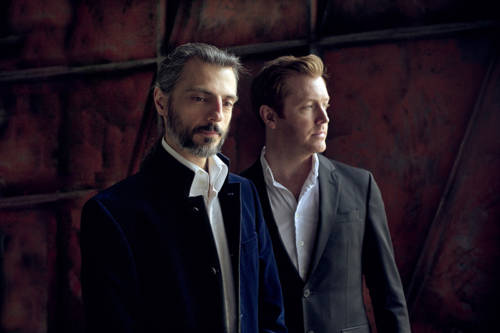
Programme
Purcell Songs & Dances
Interpreters
Tim Mead : counter-tenor
François Lazarevitch : recorder, musette & direction
David Greenberg, Augustin Lusson : violins
Sophie Iwamura : viola
Elsa Frank, Johanne Maitre : recorders, oboes
Niels Coppalle : bassoon, recorder
Marie Bournisien : triple harp
Lucile Boulanger : viola da gamba
Romain Falik : theorbo, cittern
Justin Taylor : harpsichord
Youen Cadiou : violone
Partners
Coproduction Alpha classics, with the support of the Adami and La Caisse des Dépôts.
This recording is exceptional in the ideal production of the musicians of Saint-Julien: the frank greenness of the timbres of the ensemble competes with a science of amenities as rich as it is original and daring.
resmusica – benedict hévry
Press
january 2019
The Sunday Times
Hugh Canning
Album of the week
Reactions to this absorbing and revelatory disc will, I suspect, depend on how one responds to the « Frenchified » Purcell of François Lazarevitch’s Saint-Julien musicians. I heartily approve of their imaginative, improvisatory approach, which brings some of the instrumental music – the « Jig » following May Her Blest Example (from one of the Queen Mary birthday odes) and the Scotch Tune – close to the realms of their speciality, Celtic folk music. Their soloist, the countertenor Tim Mead, could hardly be more mainstream Anglophone in his approach in a series of Purcell hits: Strike the Viol (from Come Ye Sons of Art), Fairest Isle and What Power Art Thou (the shivering song usually sung by a bass) from King Arthur, and ‘Tis Nature’s Voice (Ode for St Cecilia’s Day). The French/Celtic style rubs off on Mead’s vocal decoration to delectable effect.
january 2019
ResMusica
Bénédict Hévry
The original Purcell by Tim Mead and Les Musiciens de Saint-Julien
The Musicians of Saint-Julien, led by their founder and flautist François Lazarevitch, revisit the work of Henry Purcell with inventiveness and brilliance in the company of countertenor Tim Mead. Since 2006, the musicians of Saint-Julien, inspired by the intimate conviction and research of François Lazarevitch, have combined with the most cutting-edge musicological knowledge an intuitive practice of early music where oral and written sources mix. French flautist during the interview which serves as a presentation text for this “Purcell journey”, the aim is to compare the sources of the British composer’s scholarly inspiration, English of course (with these bass ostinatos so pregnant in the famous Fantasy upon a ground, given here by a trio of flutes), French (the final chaconne taken from TheFairy Queen) or even Italian (the instrumental virtuosity of the sonata extracts), to more popular British influences in their more robust and almost folk build (for example, throughout the Scots song Twas within a furlong of Edinborgtown or the scotch tune extracted from the music of stage for Amphytrion which follows it).
Contradance also thus regains its original meaning of country dance. The various complementary or contradictory aspects of the composer’s complex psychology are also confronted throughout this selection. We can count on the ductile and lustral voice of Tim Mead to magnify them. Its quicksilver timbre, ideal for this repertoire, tends towards the sublime, sometimes in a melancholy register (sublime O solitude, my sweetest choice Z.406, undoubtedly the most beautiful version recorded since the historic one of Alfred Deller, or elsewhere, the the essential tune of the genius of cold taken from KingArthur) sometimes under the more emancipated mask of extroversion with the Tis nature’s voice of the great ode to Sainte-Cécile Z.328 given in a theatrical feeling of great dramatic tension in its final measures. But still, this almost unreal voice can be shrouded in magical tenderness throughout more ethereal pages (the anthem Fairest Isle, from King Arthur, or One charming night from The Fairy Queen). The intelligence of the text is magnified as much by a clear and perfect articulation as by an abundant and judicious ornamentation with quasi-instrumental springs. But this recording is exceptional by the ideal realization of the musicians of Saint-Julien: the frank greenness of the timbres of the whole (such as that deployed for the march taken from Married Beau Z.603) competes with a science of amenities as rich as it is original and daring (this vibrato of the three violins fibring the Pavane in G minor Z.752 like distant memories of the flattering viol consort).
Certainly, to the great dismay of purists, the instrumental distribution is sometimes reviewed and corrected, extracts from scattered scores are skillfully edited. But it is also to better (de)show the proximity of the most accomplished writing with traditional and popular musical roots; the medley of track 7 even reserves for us the surprise of a cheerful musette among the soloists. We do not have here the more opulent and polished timbres of an English Concert or an Academy of Ancient Music, but this culture of ‘a more raw, full-bodied, almost rustic sound at times, corresponds to this new invigorating and invigorating approach relating to “the exaltation of rhythm and dance” mentioned in our columns, about the recent concert at the Salle Gaveau of our performers in this same repertoire. This incisiveness of the tempi and the agogic somewhat whips up pages that are often more neutral or elegiac elsewhere (track 2, Strike the rape, extract from the ode for Queen Mary’s birthday). But the conviction and commitment of the performers, with this almost carnal approach to a completely revisited musical text, win over the listener the total support of the listener.
december 2018
Le Devoir
Christophe Huss
Here is the wonderful François Lazarevitch and his Musicians of Saint-Julien again. The word “marvellous” should be taken in a broad sense: admirable, but at the same time stimulating the imagination. Because if there is one quality that we can associate with Lazarevitch, it is the imagination in the composition of the programs and in the sound worlds created. Compositionally, the alternation of instrumental and vocal works is superbly arranged to give a perfect “rhythm” to the program. Superimposed on this juxtaposition is that of sound universes (sublime transition of tracks 5, Ode pour Ste Cécile, and 6, The Old Bachelor) and that of styles, particularly in the learned interpretive variety of dances. In the colors chosen, Lazarevitch willingly gives a slightly Scottish flavor to Purcell, which spices it up very pleasantly, just as, moreover, he adorns it abundantly. This is also what, publication after publication, makes the price of the proposals of the Musicians of Saint-Julien: inventiveness and freedom.
november 2018
Baroquiade(s)
Stephan Wandriesse
The Ode for King Henry
Like the rainbow which adorns the cover of this recording, here is an anthology dedicated to Henry Purcell (1659-1695), colorful as you please and which will undoubtedly be a landmark. For the occasion, I brought out a whole set of recitals where Alfred Deller, Gérard Lesne, Jill Feldman, Andrew Lawrence-King all rub shoulders, without forgetting Andreas Scholl, luxuriously surrounded by the Accademia Bizantina or even Dorothee Mields with a Lautten Compagney Berlin in great shape. As we can see from this non-exhaustive inventory, the music of the Orpheus Britannicus lends itself well to this type of selection, with contrasting options, from the most intimate to the most operatic. So we will hardly be surprised to find many “hits”, almost essential, such as O Solitude, Fairest Isle, What power art thou or even One charming night.
We might ask ourselves what is the point of repeating what we already know. But we would be fundamentally wrong, because François Lazarevitch and his team pulverize everything that had previously been produced in this genre, not only through the intelligence of the program but also through the excellence of the production. A clever balance is found mixing songs and dances but also between art music and popular music, where occasional odes and stage music take the lion’s share. The Fantazia upon a ground(track 14) displays all the science of its extraordinary counterpoint, magnified here by the delicious sounds of the recorders. All this sparkles and highlights all the harmonic extravagances of the great Henry (what an ending!). In contrast, the Scotch tune (track 12) which follows Twas within a furlong of Edinboro’town’ immerses us in the atmosphere of a tavern with an infectious truculence. The Curtain tune, taken from Timon of Athen, which can also be found among Purcell’s Harpsichord Lessons under the heading “chaconne”, is stunning. Its very original bass formula gives rise to a real whirlwind which gradually takes over the upper parts which, propelled by this demonic continuo, set the stage on fire.
The Musicians of Saint-Julien delight us with all the possible combinations to combine only a few instruments in certain pages or to give the illusion of a real orchestra in others. The contrast is thus striking between the serious Pavan in G minor (track 4), close to the world of the consort and the magnificent fantasies for viols, and the triumphant March (track 16), which gives the impression that trumpets have been invited. It is also the same splendor that crowns this recording with the chaconne of Fairy Queen (track 20), truly magical and festive as can be. The other architect of this success is undoubtedly Tim Mead, a talented countertenor (he participated brilliantly a few weeks ago in the Rodelinda of Lille, reviewed in these pages), with a warm tone and confounding vocal ease! How can we resist the incredible momentum of his Strike the rape, touch the lute, taken from Queen Mary’s Birthday Ode? The vocals unfold with impressive power, the instruments following the singer’s lead and competing in virtuosity. I had to force myself to continue, I was so electrified by this tune, which I have never heard so well sung. So I let myself be won over by the poetry that also reigns in One charming night, where the gentle nocturnal atmosphere gives us admirable dreamlike music. And O Solitude renews Deller’s miracle, albeit by very different means.
An impression of nudity emerges, with a continuo, which, like a shadow unrolls its inexorable ground, hypnotizing the listener, held in suspense until the final cadence, finally offering him rest in an ineffable murmur. What intelligence of the text! As for this stubborn bass, it is never repeated as it is. No ! Our musicians know with supreme refinement how to associate a certain color, a particular inflection with each word of the poem by Katherine Philips. Have we ever heard Cold song (What power art thou) more haunting? It is impossible to emerge unscathed, as the accompaniment plunges us into an icy and macabre setting, from where the voice rises painfully, with increasing intensity until Let me freeze again to death, which sinks forever in the abyss. A frightening vision but so fascinating that it assaults you to push you to always listen to this masterful page. Here is an extraordinarily lively Purcell who gives us the impression that these pages have just come out of his fertile pen. It is not an insult to their illustrious predecessors to say that the Musicians of Saint-Julien clearly outclass them, as they have understood the very essence of this brilliant music.
october 2018
De Volkskrant
Henry Purcell is een aanstekelijkallegaartje van snaterende hobo enkwetterende blokfluit (vier sterren)
Roddelaars beweren dat het de schuld was van Frances. Zij zou haarechtgenoot, de componist Henry Purcell, op een kille Londenseherfstavond in 1695 hebben buitengesloten. Purcell vatte kou en stierfweken later, pas halverwege de dertig. Jammer van al die embryonalemeesterwerken die hij meenam naar zijn graf in Westminster Abbey.Gelukkig had de componist al aardig wat hits op zijn naam.Neem het lied Here the deities approve, over de goedgunstigheid dergoden. Boven een monter voortstappende baspartij maakt eenzangstem prachtige tournures. De Engelse countertenor Tim Meadplaatst er smeuïge versieringen omheen, volgens de regels vanPurcells tijd.Mead slaat de handen ineen met het Franse barokensemble LesMusiciens de Saint-Julien. Toegegeven, hun album is een allegaartje.Maar aanstekelijk klinkt het wel, een mars voor snaterende hobo enkwetterende blokfluit, of de horlepiep op barokharp.
september 2018
France Musique
Rodolphe Bruneau-Boulmier & Émilie Munera
The curtain is lowered and Purcell’s music is played by Les Musiciens de Saint-Julien and François Lazarevitch. This is a very beautiful disc. So we sometimes have difficulty with the new visions of baroque music, often in British music, visions which stretch this music towards variety by adorning it with multiple percussions. We also have difficulty with outdated interpretations which can make this music a bit boring and so here is finally a musician who has managed to perfectly unite these two ways, to highlight the popular aspect of Purcell’s work, its rhythmic vigor but without giving in to the call of variety while maintaining musicological seriousness. Bravo to François Lazarevitch who in this disc alternates instrumental music and sung tunes. He chose a countertenor that we really like on this show, it’s the British Tim Mead. […] He is a very, very beautiful singer. He appears in a few tunes on this Purcell record. He said it allowed him to understand the spontaneity that emanated from Purcell’s tunes.
